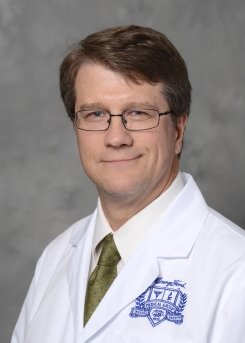Cardiovascular Disease Fellowship
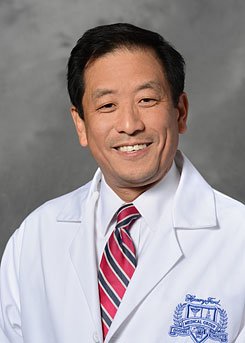
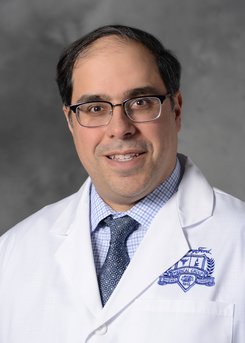
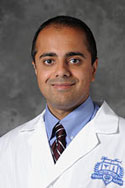
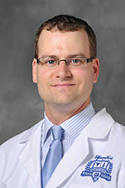
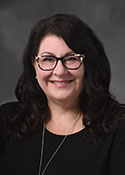

We participate in the ERAS application process and the NRMP Medical Specialties Match.
Welcome
Hear our welcome message from the program director, Bobak Rabbani, MD, MHPE, FACC as well as our faculty and fellows.
For periodic program updates and faculty and fellow profiles, please follow us on Instagram.
Henry Ford Heart & Vascular at Henry Ford Hospital is one of the nation’s top centers for heart and vascular disease. We believe that patient care, teaching, and research are all essential missions, and the Cardiovascular Disease Fellowship underscores these missions with a program designed to provide excellent training in all aspects of modern cardiology.
The Cardiovascular Disease Fellowship Program is designed to prepare fellows for academic or clinical practice in general cardiology or a subspecialty. With an emphasis on evidence based clinical training with robust volumes, a diverse patient base, and exposure to every stage of cardiovascular disease, the program provides a world-class training experience. Fellows benefit from instruction and mentorship by over 50 full-time senior staff cardiologists who are leaders in their fields.
Our 8-position per year Cardiovascular Disease Fellowship is complemented by an array of advanced subspecialty fellowships that provide our Cardiovascular Disease fellows advanced training options. Subspecialty fellows enhance the education of general cardiology fellows by teaching them and involving them in research endeavors. Many of these programs are among the first to be offered in the nation, a testament to our commitment to excellence and innovation in medical education.
Highlights of our program include:
- Overall an outstanding fellowship program with highest ACGME accreditation status recognizing the quality of instruction provided to fellows
- 100% ABIM Cardiovascular Disease Board pass rate
- Henry Ford Hospital recognized by the ACGME as one of the best teaching institutions in the country, winning the 2019 ACGME Baldwin Award
- Active teaching agenda provides fellow education through structured didactics and exceptional clinical and procedural training
- General cardiology fellows all given opportunity to gain independent proficiency (level 2 training) in cardiac catheterization, comprehensive echocardiography, nuclear cardiology and cardiac CT
- Daily general cardiology fellow conferences, in addition to conferences in subspecialty fields, are designed to cover topics needed for board exams
- Frequent grand rounds with visiting scholars from all over the world
- Multiple opportunities for interaction with and teaching medical students and residents
- Daily teaching sessions with small groups, including faculty, on every rotation
- Extensive and vigorous research in peer-reviewed journals with numerous presentations annually at national and international meetings. In 2024, over 280 publications
- Ranked #1 globally for academic productivity at the TCT conference in Oct 2024 in the structural heart space
- Fellows provided with time and faculty mentors for research as well as biostatistics support and institutional grants for research
- No 24-hour overnight call- program utilizes a night float system that is distributed among the 3 years of fellowship
- Program places an emphasis on fellow well-being and quality of life in addition to an outstanding training experience
- Prestigious alumni and faculty networks actively assist fellows in career placement after training
Henry Ford Hospital
Training takes place at Henry Ford Hospital, which is the flagship hospital and research center of the Henry Ford Health, one of the largest health systems in the nation. Our program is affiliated with Wayne State University School of Medicine and Michigan State University. The hospital is a comprehensive, 877 bed urban tertiary and quaternary care hospital and regional referral center. We are an integrated health care system and non-profit institution. Other highlights include:
- One of largest intensive care unit complexes in the country with over 160 adult beds
- Center for clinical excellence in many fields including cardiology, cardiovascular surgery, neurology, neurosurgery, orthopedics, sports medicine, organ transplant, and oncology.
- One of three level 1 trauma centers in the region.
- One of the largest teaching institutions in Michigan – 50 ACGME accredited programs with more than 675 residents and fellows in training, and over 900 medical students annually.
- Strong institutional commitment to academic medicine and medical education.
- 116 residents in our IM residency, which is one of the most innovative programs in the country
Henry Ford Medical Group
The faculty at Henry Ford are members of one of the nation’s largest, best organized, and most respected medical groups, the Henry Ford Medical Group. Our staff consists of more than 1,900 physicians and researchers in more than 40 specialties who have trained at the best academic institutions in the world. Our self-governed, employed physician practice program has been praised because of our continuing success. The brightest minds in medicine are attracted to become part of the Henry Ford Medical Group because our organization provides physicians the independence to pursue advanced clinical care while undertaking research as well as academic educational initiatives.
- There are no private patients at Henry Ford Hospital - all patients are served by the Henry Ford Medial Group
- Physicians are dedicated to evidence-based medicine
- We are a national leader in health care and education – faculty have recently been presidents of major professional societies and directors of regional and national conferences
- 40% of all physicians in Michigan received training at Henry Ford Hospital at some point in their career, and our post-graduate medical education enterprise is among the largest in the country.
Henry Ford Heart & Vascular
Henry Ford Heart & Vascular is a leader and innovator in comprehensive cardiac care, research and education. Our services include world-class heart failure, transplant, structural heart disease, advanced imaging, electrophysiology, interventional, cardiac and vascular surgery, and preventive cardiology programs. Other highlights of the training experience include:
Clinical cardiology training
- Inpatient service includes a superb 32-bed Cardiovascular Intensive Care Unit and a dedicated cardiology inpatient service with 65 telemetry beds
- Fellow led cardiology consult service provides care for hospital medical and surgical services as well as the Henry Ford Emergency Department
- Premier outpatient clinics serving a base population of more than 4.5 million people in Southeast Michigan.
- Very diverse patient base with exposure to both urban and suburban settings
- Fellows rotate through Faculty specialty clinics, preparing them to be well-rounded cardiologists and providing a foundation to develop their own niche in future practice or academics.
- Cardio-oncology
- Vascular medicine/ aortic disease
- Women’s health and cardio-obstetrics
- Preventive cardiology and cardiac rehabilitation
- Sarcoidosis
- Amyloidosis
- Lipid disorders
- Inherited cardiomyopathies
- Adult congenital heart disease
Invasive training
- Busy interventional program serving the Detroit metropolitan area and Southeastern Michigan with many regional, national, and international referrals
- Fellow-centric, fellow-friendly cath lab environment with outstanding full-time Interventional Faculty
- Attendings serve as chairs and faculty at major national scientific meetings, on editorial boards of high impact journals such as JACC Interventions, Circulation CV Interventions, and JSCAI (among others), and ACCSAP/CathSAP authors.
- Active research program participating in national and investigator-initiated trials
- More than 100 acute ST elevation myocardial infarctions and greater than 1,100-1200 percutaneous coronary interventions performed yearly at main campus
- Six state of the art cardiac catheterization laboratories at Henry Ford Hospital including 2 hybrid OR-cath lab suites.
- In addition to simple and complex coronary disease, fellows are exposed to peripheral vascular interventions, myocardial biopsies, pulmonary embolism interventions, balloon pulmonary angioplasty for CTEPH, CardioMEMS, carotid stenting, renal denervation, and percutaneous mechanical circulatory support devices (including intra-aortic balloon counterpulsation, Impella, Tandem Heart, and ECMO)
- Fellows serve as primary operator in all diagnostic and most interventional cases
- Revascularization referral center of last resort for the Midwest due to our expertise
- Training in right heart catheterization including physiologic/vasodilator challenge and hepatic wedge pressure evaluation in evaluation of advanced heart failure/transplant/LVAD, pulmonary hypertension, and congenital heart disease
- World renowned cardiogenic shock and chronic total occlusion intervention programs
- Hospital performs over 500 cardiac surgeries per year, many of them complex.
Cardiac imaging training
- Comprehensive training in all aspects of echocardiography in a busy laboratory performing more than 25,000 studies annually with electronic data mining capabilities for research projects
- In depth exposure to 3D transthoracic and transesophageal echocardiography and 2D strain imaging with the latest equipment and software
- High volume TEE program with exposure to high level quaternary care imaging protocols including LVAD evaluations and complex valve disease
- Dedicated echo teaching curriculum with an emphasis on fellows working early on with sonographers to master scanning skills
- Training in the full spectrum of nuclear cardiology studies with all the latest protocols for stress perfusion imaging including CT attenuation correction (CTAC), amyloid imaging, MUGA, SPECT/PET imaging for ischemia/viability and full range of PET blood flow analysis for ischemia and microvascular disease and sarcoidosis imaging
- Outstanding nuclear didactic curriculum, led by former ASNC national board review chair, also includes interpretation basics of CTAC, SPECT and PET stress/ viability/ amyloid/ sarcoid and myocardial blood flow analysis with PET
- Advanced cardiac imaging training opportunities in cardiac CT (opportunity to obtain level 2 training) and MRI
- Coronary CT angiography performed with state of the art 256-slice dual source CT scanners and includes coronary calcium scoring and FFRCT analysis
- Robust cardiac MRI program with 3T and 1.5T magnets in routine clinical use
- Extensive research opportunities with ability to participate in single and multicenter noninvasive trials in addition to fellow driven projects with mentorship by nationally renowned noninvasive cardiologists
Electrophysiology training
-
Our program is participating in the ACC/HRS/ACGME/ABIM Cardiovascular Disease and Clinical Cardiac Electrophysiology Competency-Based Alternative Training Pathway, allowing fellows to complete general cardiology and electrophysiology training in 4 years instead of 5.
-
State of the art electrophysiology facilities with 5 dedicated EP labs
-
Over 3000 studies performed annually including over 700 ablations; excellent exposure to consultative EP, pacemaker insertion and evaluation,and ICD implantation (including subcutaneous and biventricular).
-
Very active VT and PVC ablation and high-risk lead extraction program with frequent referrals from around the region
-
State of the art magnetic navigation laboratory for complex ablations
-
Training in implantation of leadless pacemakers and conduction system (His bundle) pacing
-
3D mapping system and cryoablation techniques available for training
-
The arrhythmia section is actively involved in clinical research and participates in national multi-center trials as well as on-going investigator initiated studies
Heart failure training
- Only hospital in Detroit metropolitan area performing heart transplantation or left ventricular assist devices, and only 1 of 3 in the state of Michigan
- Busy advanced heart failure services
- 25-30 heart transplants and 50 LVADs performed yearly
- One of the highest volume centers in Michigan
- Chronically following over 200 heart transplant patients and over 150 LVAD patients
- Active research program including clinical trials, genomics and precision medicine, mechanical circulatory support, exercise physiology and pre-clinical/ basic laboratory studies.
- Mentors are active in heart failure and transplant societies and national registries. Heart Failure program generates about 50 publications per year.
- Extensive experience in intensive care including invasive hemodynamic monitoring and temporary mechanical circulatory support
- Pre-transplant evaluation including heart failure risk stratification, optimization, ambulatory invasive hemodynamic monitoring, and cardiopulmonary stress testing
- Post-transplant management including immunosuppression, and myocardial biopsy performance and interpretation
- Management of all forms of implanted ventricular assist devices (including temporary support) and artificial hearts
- Training in pulmonary hypertension management and participation in catheterization studies unique to patients with PH and RV failure
- Our team performs multiorgan transplants (e.g. heart lung, heart kidney)
- Multidisciplinary amyloid, sarcoid, hypertrophic and genetic cardiomyopathy program
Structural heart disease training
- One of the most active and innovative Structural Heart Disease (SHD) Programs in the world with:
- more than 2,700 patient encounters per year
- over 475 transcatheter aortic valve replacements per year in 3 facilities (the largest volume in Michigan and one of the largest in the country).
- over 260 percutaneous left atrial appendage closures per year at main campus, and 425 per year system wide.
- over 150 mitral intervention procedures, including over 100 MV transcatheter edge-to-edge repairs, annually
- largest transcatheter tricuspid experience experience in the country, with a research portfolio that includes transcatheter replacement, annuloplasty, and edge-to-edge repair approaches
- Review a complete listing of our Center for Structural Heart Disease procedure volumes.
- Our program receives the most complex referrals from other in-state and out-of-state structural programs
- Review a list of multiple first in country and first in human successful SHD interventions
- Wide variety of transcatheter structural heart disease interventions including PFO/ASD/VSD closure, alcohol septal ablation, percutaneous aortic and mitral valvuloplasty, transcatheter valve replacement (all valves), percutaneous left atrial appendage closure, percutaneous repair for mitral regurgitation, balloon atrial septostomy, and percutaneous paravalvular leak closure
- One of few hospitals in the Midwest with access to both transcatheter tricuspid repair and tricuspid replacement clinical trials
- Fellows benefit not only from clinical and procedural, and research exposure to SHD interventions but also from novel training in advanced structural heart imaging (e.g. 3D TEE in structural heart interventions, cardiac CT and MRI)
Thank you for taking the time to learn about our program, and we hope that you will consider applying. As you can see the framework for our fellowship is strong, but the most important aspect of our program is our fellows. They are our colleagues and friends, and are clearly what makes our program so special. We hope to see you for an interview, and please do not hesitate to contact us if you have questions.
Sincerely,
Bob Rabbani, MD, MHPE, FACC
Program Director
Cardiovascular Disease Fellowship Program
Henry Ford Hospital
.svg?iar=0&hash=F6049510E33E4E6D8196C26CCC0A64A4)
/hfh-logo-main--white.svg?iar=0&hash=ED491CBFADFB7670FAE94559C98D7798)
